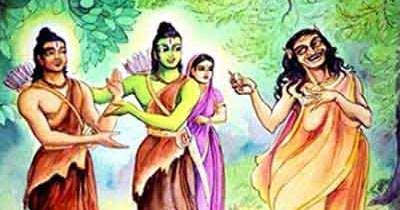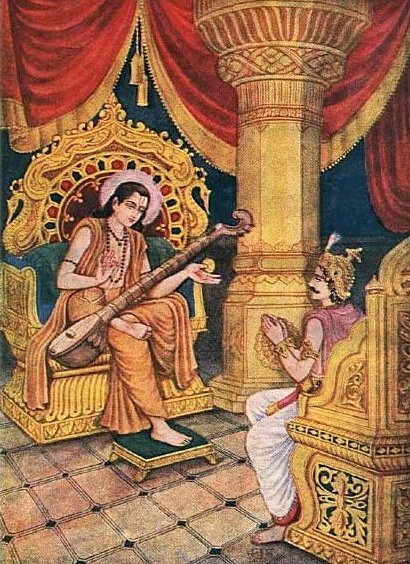
In the Araṇya-kāṇḍa of Tulasī Rāmāyaṇa,
One reads of the following dialogue (saṁvāda) between Śrī Rāma & his brother Lakṣmaṇa.
Once when Śrī Rāma was sitting comfortably & relaxed,
Lakṣmaṇa found it an opportune time to ask
(1/18)
#ŚrīRāmacaritamānasa
#ŚrīRāmaJāyāṃ
One reads of the following dialogue (saṁvāda) between Śrī Rāma & his brother Lakṣmaṇa.
Once when Śrī Rāma was sitting comfortably & relaxed,
Lakṣmaṇa found it an opportune time to ask
(1/18)
#ŚrīRāmacaritamānasa
#ŚrīRāmaJāyāṃ

for clarification regarding Knowledge, Dispassion, Māyā, Devotion,
Because of which the Paramātmā showers His Kṛpā,
and the difference between the Paramātmā & the individual Ātman.
In reply to the question on devotion,
Śrī Rāma says,
Because of which the Paramātmā showers His Kṛpā,
and the difference between the Paramātmā & the individual Ātman.
In reply to the question on devotion,
Śrī Rāma says,
जातें बेगि द्रवउँ मैं भाई।
सो मम भगति भगत सुखदाई॥
(श्रीरामचरितमानस-३·१५·१)
“That because of which My heart quickly Melts & which gives much joy to the Devotee is Devotion."
Such love touches His heart & He rushes to embrace His devotee.
Many devotees think Bhākti is a particular
सो मम भगति भगत सुखदाई॥
(श्रीरामचरितमानस-३·१५·१)
“That because of which My heart quickly Melts & which gives much joy to the Devotee is Devotion."
Such love touches His heart & He rushes to embrace His devotee.
Many devotees think Bhākti is a particular

act. If a person goes regularly to a Mandir, He is considered a great devotee.
He may or may not be a devotee as doing a lot of rituals is not the essence of devotion.
Some others think that devotion is mere display of emotions.
One who cries easily on hearing about the virtues
He may or may not be a devotee as doing a lot of rituals is not the essence of devotion.
Some others think that devotion is mere display of emotions.
One who cries easily on hearing about the virtues
of the Lord, or whilst singing devotional songs, is thought to be a devotee.
Does it mean that if one is Unable to do so, one has No devotion? That is Not so.
Acts of devotion or display of emotions is not necessarily a sign of devotion,
But if one has devotion he may perform
Does it mean that if one is Unable to do so, one has No devotion? That is Not so.
Acts of devotion or display of emotions is not necessarily a sign of devotion,
But if one has devotion he may perform
acts of devotion like Puja or display emotions.
Emotional people cry about anything & everything.
That is Not Devotion.
In Uttara-kāṇḍa, Kākabhuśuṇḍi tells Garuḍa,
मिलहिं न रघुपति बिनु अनुरागा।
किएँ जोग तप ग्यान बिरागा॥
(श्रीरामचरितमानस-७·६१·१)
"Even if one does a lot of
Emotional people cry about anything & everything.
That is Not Devotion.
In Uttara-kāṇḍa, Kākabhuśuṇḍi tells Garuḍa,
मिलहिं न रघुपति बिनु अनुरागा।
किएँ जोग तप ग्यान बिरागा॥
(श्रीरामचरितमानस-७·६१·१)
"Even if one does a lot of

yoga or penance, gains Knowledge, or develops Dispassion,
one cannot meet the Paramātmā without True Love for Him.”
True love alone is the essence of devotion.
Therefore,
in Prārthanā too it is better to Have a Heart Without Words
than to have many Words without the Heart in it.
one cannot meet the Paramātmā without True Love for Him.”
True love alone is the essence of devotion.
Therefore,
in Prārthanā too it is better to Have a Heart Without Words
than to have many Words without the Heart in it.
Swami Chinmayananda said,
“Work is love made Visible.”
In our day-to-day Life, many people do their work without their heart in it.
Since they do it regularly they manage to do the task at hand efficiently,
But we can clearly see that there is nothing special or beautiful
“Work is love made Visible.”
In our day-to-day Life, many people do their work without their heart in it.
Since they do it regularly they manage to do the task at hand efficiently,
But we can clearly see that there is nothing special or beautiful

in their work.
The person himself or herself also knows that it is being done just for the sake of doing,
Mechanically,
Without putting his or her best into it.
However,
If there is True love behind the work, it Stands out.
A person Outshines his or her abilities.
The person himself or herself also knows that it is being done just for the sake of doing,
Mechanically,
Without putting his or her best into it.
However,
If there is True love behind the work, it Stands out.
A person Outshines his or her abilities.
Even a few Words, or a Gesture, or a look with True love is Potent.
Great men achieve much because of this Power of True Love.
What is True Love (anurāga)?
Rāga is an attachment, liking, fascination or infatuation.
Such love is fickle & without depth.
Great men achieve much because of this Power of True Love.
What is True Love (anurāga)?
Rāga is an attachment, liking, fascination or infatuation.
Such love is fickle & without depth.

खल कै प्रीति जथा थिर नाहीं॥
(श्रीरामचरितमानस-४·१३·१)
"Love of a deceitful or superficial person is also fickle."
Anurāga on the other hand is steadfast, deep & lasting.
When Śrī Rāma, Lakṣmaṇa & Ma Sītā were residing in Pañcavaṭī, Rāvaṇa’s sister, Śūrpaṇakhā happened to
(श्रीरामचरितमानस-४·१३·१)
"Love of a deceitful or superficial person is also fickle."
Anurāga on the other hand is steadfast, deep & lasting.
When Śrī Rāma, Lakṣmaṇa & Ma Sītā were residing in Pañcavaṭī, Rāvaṇa’s sister, Śūrpaṇakhā happened to
come there.
She was instantly attracted to Śrī Rāma.
With her Asuric powers,
She transformed herself into a beautiful young damsel & approached Śrī Rāma saying,
तुम्ह सम पुरुष न मो सम नारी।
(श्रीरामचरितमानस-३·१६·४)
“There is no man to equal You & no woman like Me. We are made
She was instantly attracted to Śrī Rāma.
With her Asuric powers,
She transformed herself into a beautiful young damsel & approached Śrī Rāma saying,
तुम्ह सम पुरुष न मो सम नारी।
(श्रीरामचरितमानस-३·१६·४)
“There is no man to equal You & no woman like Me. We are made

for each other."
What she said is True.
Who can equal the Prabhu in Beauty, Strength, Knowledge & Virtue?
And who can equal Śūrpaṇakhā in deceit!
Even though she was a widow,
She lied saying that she had remained unmarried as she had found no one to match her greatness.
What she said is True.
Who can equal the Prabhu in Beauty, Strength, Knowledge & Virtue?
And who can equal Śūrpaṇakhā in deceit!
Even though she was a widow,
She lied saying that she had remained unmarried as she had found no one to match her greatness.
Đ Omniscient Śrī Rāma smiled & said that He was married & introduced His wife Sītā.
He added that Lakṣmaṇa was without his wife.
Immediately she shifted her affections to Lakṣmaṇa.
Alas!
Even after coming so close to the Prabhu, she could Not attain Him!
He added that Lakṣmaṇa was without his wife.
Immediately she shifted her affections to Lakṣmaṇa.
Alas!
Even after coming so close to the Prabhu, she could Not attain Him!

Such is the fleeting Nature of attachment.
An Attached,
Fickle,
&
Deceitful Mind does Not allow us to remain with the Prabhu.
On the other hand Śabarī,
waited for years for the Prabhu with a heart filled with Devotion.
The Prabhu Himself came to her.
An Attached,
Fickle,
&
Deceitful Mind does Not allow us to remain with the Prabhu.
On the other hand Śabarī,
waited for years for the Prabhu with a heart filled with Devotion.
The Prabhu Himself came to her.

Anurāga brings Bhagavān to Your doorstep.
Rāga takes You away from Him.
With a Heart filled with such Love you May or may Not do anything in particular to express your Love.
We Love our children Unconditionally.
Do we feel compelled to express our love all the time?
Rāga takes You away from Him.
With a Heart filled with such Love you May or may Not do anything in particular to express your Love.
We Love our children Unconditionally.
Do we feel compelled to express our love all the time?

It is Not necessary.
Love remains all the time even if we do Not express it in Words or Deeds.
(Of course, Expressing it gives the one who loves & the beloved much Joy & Nourishes the relationship.)
True Love alone melts the Bhagavān. He then rushes to meet His devotee.
Love remains all the time even if we do Not express it in Words or Deeds.
(Of course, Expressing it gives the one who loves & the beloved much Joy & Nourishes the relationship.)
True Love alone melts the Bhagavān. He then rushes to meet His devotee.
Being all-Pervading, it does Not take Him any time to Manifest.
तस्मात्सर्वगतं ब्रह्म नित्यं यज्ञे प्रतिष्ठितम्।
(भगवद्-गीता-३·१५)
"The all-pervading Paramātmā always resides in all Actions that spring from Devotion."
llहरी ॐ तत् सत्ll
।।श्री रामा जयम।।
।।Śrī Rāma Jāyāṃ।।🙏
तस्मात्सर्वगतं ब्रह्म नित्यं यज्ञे प्रतिष्ठितम्।
(भगवद्-गीता-३·१५)
"The all-pervading Paramātmā always resides in all Actions that spring from Devotion."
llहरी ॐ तत् सत्ll
।।श्री रामा जयम।।
।।Śrī Rāma Jāyāṃ।।🙏

• • •
Missing some Tweet in this thread? You can try to
force a refresh















